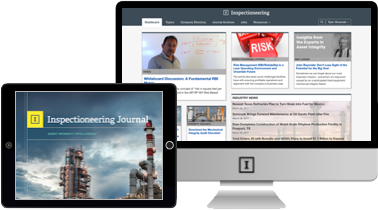If someone told you that you could do one simple thing that would greatly improve your Mechanical Integrity program and almost certainly prevent a future catastrophic incident, would you do it? And suppose you could do this with your current personnel. You might be saying, “What’s the catch?” There is no catch, just a different way of looking at things that will take a little upfront effort, but the payoff will be many times greater than the initial effort.
Introduction
Do you ever wonder why the United States Department of Homeland Security is always telling us to be ever-vigilant, and “If You See Something, Say Something”? The government believes that millions of people being vigilant, looking for suspicious activity and reporting on it, will help prevent violent crimes and terrorist activity. Mechanical Integrity (MI) managers in plants around the world should adopt the same philosophy in relation to small incidents or near incidents. Think about it; if everyone in an industrial setting actively looked for things that were not right or seemed different, or looked at small mistakes as opportunities to prevent larger ones, what would the future look like?
“…there are still too many small incidents
that lead to major failures.”
The MI community now has some help in a recommended practice published by the American Petroleum Institute. API RP 585, Pressure Equipment Integrity Incident Investigation, is a document originally published in April of 2014. This recommended practice highlights the value of investigating low and medium consequence pressure equipment integrity incidents. The goal is for everyone working in the MI field to be able to conduct investigations on lower consequence incidents and near failures regarding pressure equipment loss of containment, so that organizations can learn from the smaller failures and correct systemic causes before they are allowed to contribute to a major incident.
API RP 585 is an important step in bringing heightened awareness to the value of investigating and understanding the causes of small equipment failures or surprise damage before they lead to major catastrophic failure. Having investigated numerous major failures, it is evident that there were small failures leading up to the larger one that should have been investigated, and if addressed properly, could have prevented the major failure. This article is an effort to raise awareness, as there are still too many of the same small incidents leading to major failures across the industry.
Highlights of API RP 585
This new recommended practice (RP), focusing on pressure equipment integrity incidents, provides guidance on how investigating and determining the root causes of small failures, near failures, and unexpected events can improve mechanical integrity and prevent catastrophic failures. This RP also provides guidance on how management can support large investigations that are led by others within the organization.
API RP 585 describes three levels of investigation: low consequence incidents which would normally have a level 1 investigation, medium consequence incidents which would normally have a level 2 investigation, and high consequence incidents which would normally have a level 3 investigation. The primary differences in the investigation levels are the number of people involved and the depth of the analysis to determine the root causes. The main focus of the document is to explain how to conduct level 1 and level 2 investigations. It describes best practices for collecting and analyzing evidence to determine the causes of the incident. The document also provides guidance on training personnel so that they are ready to respond when incidents occur.
Many pressure equipment incidents result in damaged components or parts that require failure analysis. A protocol for handling these components and conducting the failure analysis is also presented in the document.
API RP 585 also provides a number of example forms and reporting formats, including:
-
A form that can be used to record information for all pressure equipment integrity incidents
-
Final report forms for each investigation level
-
A listing of generic evidence that could be used as a starting point to help determine all the evidence or information that needs to be collected
-
Key questions to ask eye witnesses
-
A failure analysis request form that can be used to ensure that all steps in the process are documented
This new API RP is a great reference and basic starting point for integrating incident investigations on pressure equipment integrity issues into the culture and procedures of your facility.

















Comments and Discussion
Add a Comment
Please log in or register to participate in comments and discussions.